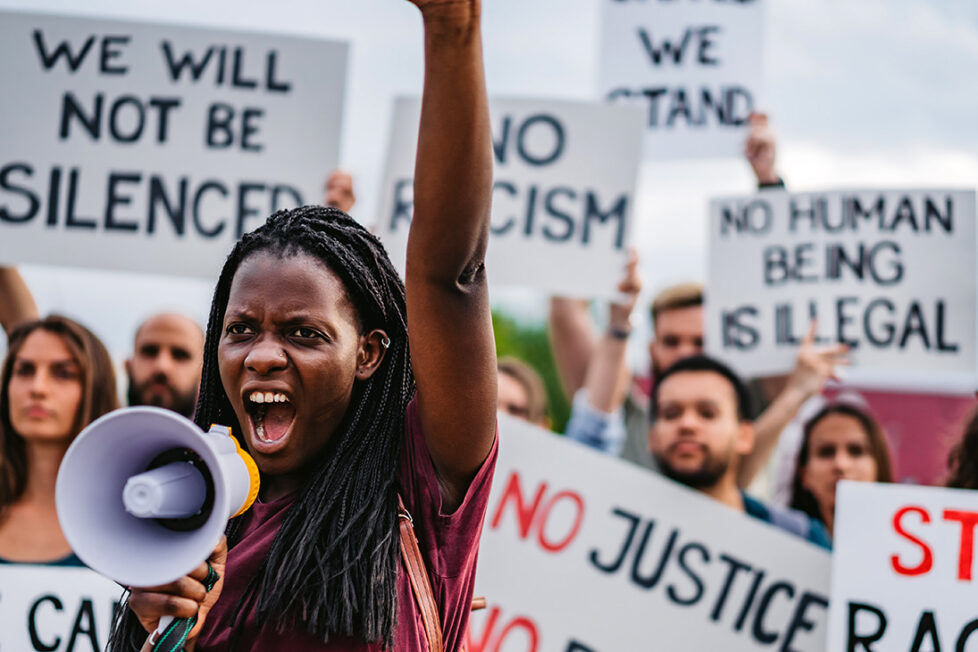Allies push for Trump administration’s focus on ‘anti-white racism’ in civil rights interpretation


By: Stacy M. Brown, NNPA
Donald Trump’s history is riddled with instances of racism and racially charged remarks, which have only intensified as he faces legal challenges and seeks a return to the White House. Despite his claims to the contrary, Trump’s language and actions consistently reveal deep-seated bigotry.
In response to his four criminal indictments and 91 felony charges, Trump has attacked prosecutors and judges, often resorting to explicitly racist language. He’s labeled Black prosecutors handling his cases as “animals,” “criminals,” and “racists,” using language that resonates with his supporters and incites further division.
Trump’s past is marred by accusations of discrimination, including a lawsuit alleging he refused to rent apartments to Black tenants in the 1970s. He infamously called for the execution of the Central Park Five, despite their subsequent exoneration, and has made derogatory remarks about Native Americans, Latinos, Asians, and other minority groups.
During his presidency, the twice-impeached Trump promoted racist narratives, such as suggesting immigrants from certain countries were undesirable and pushing the debunked “birther” conspiracy theory against Barack Obama. He enacted policies like the Muslim ban and targeted fair housing rules, all while using inflammatory language to sow fear and hatred.
Trump’s rhetoric has encouraged his supporters, and, despite facing legal scrutiny and condemnation, Trump’s influence on far-right movements and conspiracy theories persists, posing a threat to democracy and exacerbating racial tensions.
According to a report from Axios, Trump and his allies are plotting anti-racism protections for white people. The report said the proposed shift would see a redirection of focus from combating discrimination against people of color to what they term “anti-white racism.” Underpinning the push is a flurry of legal actions orchestrated by Trump-aligned groups, notably America First Legal, founded by former Trump aide Stephen Miller. Leveraging the language of civil rights, these groups have challenged existing policies and norms, with some cases achieving notable success. For example, contemporary legal disputes have focused on discriminatory practices within the entertainment and professional sports sectors, alleging that affirmative action-like initiatives put white people at a disadvantage.
The Heritage Foundation’s “Project 2025,” which envisions a Trump administration dismantling what they perceive to be “affirmative discrimination,” is one organization that has articulated a larger agenda. Central is the assertion that policies designed to uplift marginalized communities come at the expense of others.
As Axios reported, America First cited the Civil Rights Act of 1964 in a lawsuit against CBS and Paramount Global for what the group argued was discrimination against a white, straight man who was a writer for the show “Seal Team” in 2017. The group also filed a civil rights complaint against the NFL over its “Rooney Rule,” which was instituted in 2003 and expanded in 2022.
American First argued that “given the limited time frame to hire executives and coaches after the season, this results in fewer opportunities for similarly situated, well-qualified candidates who are not minorities.” In 2021, Miller’s group successfully sued to block the implementation of a $29 billion pandemic-era program for women- and minority-owned restaurants, saying it discriminated against white-owned businesses.
“This ruling is the first, but crucial, step towards ending government-sponsored racial discrimination,” Miller said then. Axios also highlighted that Trump-aligned groups have gained momentum with the Supreme Court’s turn to the right — most notably its recent rejection of affirmative action in college admissions. The court ruled that programs designed to benefit people of color and address past injustices discriminate against white and Asian Americans. A federal judge blocked a $4 billion program to help Black farmers in 2021. Las month, another federal judge ruled that the Commerce Department’s Minority Business Development Agency discriminated against white people and that the program must be open to everyone.
Most recently, The Legal Insurrection Foundation filed the legal complaint with the U.S. Department of Education Office for Civil Rights. The conservative nonprofit says its mission is devoted to advancing free expression and academic freedom on campuses.
The foundation claims the George Floyd Memorial Scholarship is violating Title VI of the Civil Rights Act of 1964, which “prohibits discrimination on the basis of race, color and national origin in programs and activities receiving federal financial assistance.”
“Every institution in America is under attack from this Marxist concept of ‘equity,’” Trump said in 2023. “I will get this extremism out of the White House, out of the military, out of the Justice Department, and out of our government.”
